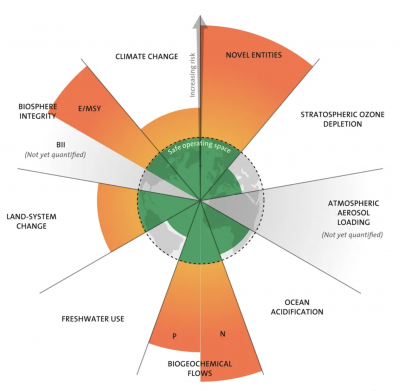Ecological crisis: Difference between revisions
No edit summary |
No edit summary |
||
| Line 1: | Line 1: | ||
[[File:Planetary boundaries.png|alt=Planetary Boundaries framework (2022) showing 5 boundaries transgressed.|thumb|400x400px]] | [[File:Planetary boundaries.png|alt=Planetary Boundaries framework (2022) showing 5 boundaries transgressed.|thumb|400x400px|Planetary Boundaries framework (2022) - climate change is only one of the 5 boundaries transgressed.]] | ||
'''In the 1960s, humans took about three-quarters of what the planet could regenerate annually.'''<ref name=":1">https://www.frontiersin.org/articles/10.3389/fcosc.2020.615419/full</ref> '''By 2016 this rose to 170 percent. We are now amidst,''' a race between a how fast we can get to a social tipping point versus the time it takes to reach a [[global ecological tipping point]]. The accelerant towards this is fueled by: | '''In the 1960s, humans took about three-quarters of what the planet could regenerate annually.'''<ref name=":1">https://www.frontiersin.org/articles/10.3389/fcosc.2020.615419/full</ref> '''By 2016 this rose to 170 percent. We are now amidst,''' a race between a how fast we can get to a social tipping point versus the time it takes to reach a [[global ecological tipping point]]. The accelerant towards this is fueled by: | ||
* '''Climate change''' - s''ince records began in 1880, nineteen of the twenty hottest years have occurred since 2000''<ref>NASA, Global Temperature: https://climate.nasa.gov/vital-signs/global-temperature/</ref>''.'' | * '''Climate change''' - s''ince records began in 1880, nineteen of the twenty hottest years have occurred since 2000''<ref>NASA, Global Temperature: https://climate.nasa.gov/vital-signs/global-temperature/</ref>''.'' | ||
Revision as of 06:30, 9 May 2022
In the 1960s, humans took about three-quarters of what the planet could regenerate annually.[1] By 2016 this rose to 170 percent. We are now amidst, a race between a how fast we can get to a social tipping point versus the time it takes to reach a global ecological tipping point. The accelerant towards this is fueled by:
- Climate change - since records began in 1880, nineteen of the twenty hottest years have occurred since 2000[2].
- Biodiversity loss - there has been a 68% average decline in the population sizes of mammals, birds, amphibians, reptiles, and fish between 1970 and 2016[3].
- Nitrogen cycle - ammonia factories supplement the enzymatic magic of microbial nitrogen fixation with the brute forces of temperature and pressure, extracting close to 100 million metric tons of nitrogen from the atmosphere each year. This results in the creation of Nitrous Oxide which is a 200 times more potent as a greenhouse gas than CO2[4].
- Deforestation - more than half the world’s tropical forests have been destroyed since the 1960s[5].
- Ocean acidification - more CO2 in the atmosphere means more acidity in the oceans.
- Microplastics via overconsumption - humanity is running an ecological Ponzi scheme in which society robs nature and future generations to pay for boosting incomes in the short term.[6]
- Ozone depletion, the phosphorus cycle...
We are overstepping our planetary boundaries (great documentary) pushing us to specific tipping points:
All of these issues combined are accelerating us towards collapse.
Root Cause
We are treating the symptoms of the disease not the disease itself. Like a doctor treating the symptoms of a cancer instead of treating the cancer itself, we are concentrating on divesting from fossil fuels, investing in renewables and reducing plastic use instead of what really needs to be done. Furthermore, perhaps symptom management placates the anxiety we feel that drastic change is needed.
References
- ↑ https://www.frontiersin.org/articles/10.3389/fcosc.2020.615419/full
- ↑ NASA, Global Temperature: https://climate.nasa.gov/vital-signs/global-temperature/
- ↑ IPBES, Media Release, Nature’s Dangerous Decline ‘Unprecedented’; Species Extinction Rates ‘Accelerating’ May 2019
- ↑ http://www.engineeringchallenges.org/challenges/nitrogen.aspx#:~:text=Such%20human%20activity%20has%20doubled,rain%2C%20and%20contaminating%20drinking%20water.
- ↑ International Union for Conservation of Nature. (2021, February). Deforestation and forest degradation. https://www.iucn.org/resources/issues-briefs/deforestation-and-forest-degradation
- ↑ Yale Environment 360: Avoiding a ‘Ghastly Future’: Hard Truths on the State of the Planet. Accessed on 3rd March 2022 via:https://e360.yale.edu/features/avoiding-a-ghastly-future-hard-truths-on-the-state-of-the-planet
